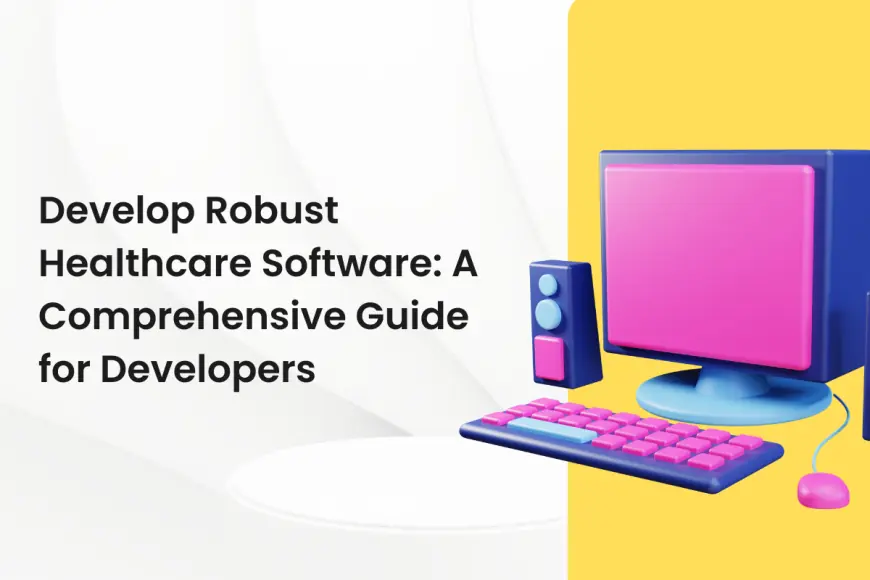Develop Robust Healthcare Software: A Comprehensive Guide for Developers
Discover how to develop robust healthcare software with this comprehensive guide. Learn about key steps, challenges, and solutions, including regulatory compliance, data security, and UX design. Partner with Zenesys for expert healthcare software development services.

Healthcare software has become an indispensable part of the modern medical industry. With the increasing demand for efficient, secure, and user-friendly solutions, healthcare software development is no longer an optional investment but a necessity. From patient management systems to telemedicine platforms, these applications play a critical role in improving patient care, optimizing operations, and ensuring regulatory compliance.
In this comprehensive guide, we will delve into the key aspects of healthcare software development, addressing what it entails, why it’s essential, and how you can build a robust solution that meets industry standards. By the end of this article, you’ll have a thorough understanding of the development process and the steps needed to ensure your software is successful.
What is Healthcare Software Development?
Healthcare software development refers to the process of creating, designing, testing, and deploying software solutions tailored specifically for the healthcare industry. These solutions are designed to address various needs, including patient care, medical data management, appointment scheduling, billing, telemedicine, and more. Examples of healthcare software include:
-
Electronic Health Records (EHR): Systems that store and manage patient records digitally.
-
Telemedicine Platforms: Tools enabling remote consultation and diagnosis.
-
Healthcare Mobile Apps: Applications for fitness tracking, medication reminders, or virtual health consultations.
-
Practice Management Software: Systems to manage daily operations in clinics or hospitals.
Why is Healthcare Software Development Important?
1. Improved Patient Care:
Healthcare software enhances the quality of care by providing doctors with accurate patient information and enabling real-time communication between patients and providers.
2. Operational Efficiency:
From automating appointment scheduling to streamlining billing processes, healthcare software reduces administrative burdens and helps medical staff focus on patient care.
3. Data Security and Compliance:
Developing software with security features ensures the confidentiality and integrity of sensitive patient data. Additionally, adherence to standards like HIPAA (Health Insurance Portability and Accountability Act) is critical for avoiding legal issues.
4. Accessibility:
Telemedicine and mobile apps increase access to healthcare services for patients in remote or underserved areas, breaking geographical barriers.
5. Cost-effectiveness:
By automating routine tasks and improving resource allocation, healthcare software can significantly reduce operational costs.
How to Develop Robust Healthcare Software
Creating effective healthcare software requires meticulous planning, execution, and testing. Here are the steps you should follow:
1. Understand the Requirements:
Begin by defining the scope of the software. Identify the primary purpose of the application, the target audience (patients, doctors, or administrators), and the specific challenges you aim to address. Engage stakeholders, including medical professionals and patients, to gather insights.
2. Regulatory Compliance:
Healthcare is a highly regulated industry, and non-compliance can lead to severe penalties. Familiarize yourself with the laws and standards that apply to your region, such as HIPAA, GDPR (General Data Protection Regulation), or HL7 (Health Level Seven).
3. Choose the Right Technology Stack:
Select programming languages, frameworks, and tools that align with the project’s requirements. For example, you might use Python or Java for backend development, and frameworks like React or Angular for the frontend.
4. Focus on User Experience (UX):
Healthcare professionals and patients may not be tech-savvy, so ensure your software is intuitive and easy to use. Prioritize simplicity, accessibility, and responsiveness in the design.
5. Ensure Data Security:
Incorporate robust encryption methods, multi-factor authentication, and regular security audits to protect sensitive patient information. Data security should be a core consideration from the outset.
6. Integration Capabilities:
Modern healthcare systems rely on interoperability. Ensure your software can integrate seamlessly with other systems, such as EHRs, billing platforms, or lab management systems.
7. Testing and Quality Assurance:
Thoroughly test your software to identify and fix bugs, ensure functionality, and verify compliance. Use both manual and automated testing approaches to cover all aspects.
8. Deployment and Maintenance:
After deployment, monitor the software’s performance and collect feedback for future updates. Provide ongoing support to address issues and keep the system up to date with regulatory changes.
Challenges in Healthcare Software Development
While the benefits are substantial, developing healthcare software comes with challenges:
-
Regulatory Complexity: Navigating legal requirements can be daunting.
-
Data Security Threats: Cybersecurity risks are ever-present, making it crucial to adopt stringent measures.
-
Interoperability Issues: Integrating with existing systems can be technically demanding.
-
High Development Costs: Healthcare software often requires substantial investment in development and maintenance.
Partner with Experts
Healthcare software development is a specialized field requiring expertise in both technology and healthcare. If you want to ensure a seamless development process, it’s wise to collaborate with professionals. Zenesys offers end-to-end healthcare software development services, providing customized solutions to meet your unique needs. Whether you need a telemedicine platform, an EHR system, or a mobile health app, Zenesys can deliver high-quality software tailored to your requirements.
Conclusion
The development of robust healthcare software is a complex but rewarding process. By addressing real-world challenges, improving patient care, and ensuring compliance, well-designed healthcare software can transform the medical industry. With careful planning, a focus on security and usability, and the expertise of trusted partners like Zenesys, you can create solutions that stand out in the competitive healthcare market.
Investing in healthcare software development is not just about keeping up with technological trends; it’s about shaping the future of healthcare and making a meaningful impact on people’s lives. Begin your journey today and play your part in revolutionizing the industry.
What's Your Reaction?
 Like
0
Like
0
 Dislike
0
Dislike
0
 Love
0
Love
0
 Funny
0
Funny
0
 Angry
0
Angry
0
 Sad
0
Sad
0
 Wow
0
Wow
0

























































